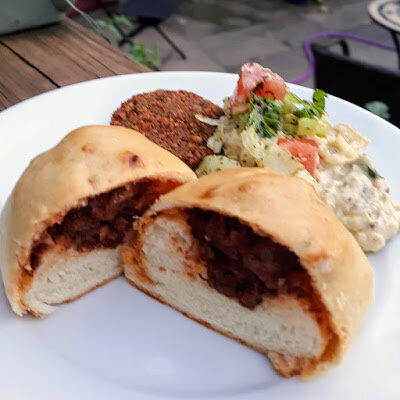Fateyah (Arab filled Bread)
Beef seasoned with warm Arab spicces, baked in light bread.
A Lebanese friend introduced me to "fa-tie-ah" at a Christmas Open House she hosted every year with the most wonderful Lebanese food. These little golden puffs of bread filled with warm Arabic spiced ground beef, fried onions, rich with butter and studded with pine nuts became a family favorite. In fact, they received the honor of being placed on the menu of the traditional Christmas Eve buffet at our home.
Along with various dips which always included hummous, fateyah took its place of honor on the holiday table or on the picnic blanket when picnicking in the shepherd's fields overlooking Bethlehem, or when looking for a hint of Christmas, sitting unknowingly on the King's forested private property in Jordan. That time we were driven off by a guard.....we should have given him a fateyah and he would have welcomed us to stay
If you are intimidated at working with yeasted dough, I would happily offer you "yeasted dough therapy" if I could and in my cooking classes have forced students to face yeast head on! People often worry about killing the yeast or ending up with a lump or hardtack when the timer goes off at the end of baking. But truly, yeast is quite a hardy fungus and I have rarely had it fail me, and then probably because it was already deceased when I used it.
If you follow a couple of rules, you too can create these softy pillowy delights. This is a yeast dough that is generous in the rising and creates a soft, malleable dough that is happy to become a fateyah.
Couple of rules: let the yeast rise first, as the recipe instructs in a small amount of lukewarm water. Now, if you're wondering what lukewarm is, no hotter than the milk in a baby's bottle is a good guide, but if you don't know how hot that is, you don't have to search for a wisened mother to show you. Go for tepid water, or even a bit to the cool side if you're still concerned - just not ice-cold water. Yeast will rise, though more slowly in cool water. Be sure to let the dough rise as long as the time suggested in the recipe.
You can use your bread-proofing function on your oven if you have it. Otherwise, cover the bowl with a clean towel or plastic wrap and set on the counter where there are no cold drafts and forget about it for a couple of hours. It knows how to do what it needs to do and you don't have to help it along. You can even place your dough to rise in the refrigerator overnight or all day and come back to it later when you're ready to create the fateyah
When you shape the balls of dough let them sit for 10 minutes or so to get used to their new shape and then when you roll the balls out into flat circles, again be patient with your dough - it has to think about it a bit before it relaxes and keeps the shape you are insisting upon. In fact, if the dough shrinks back as you roll it, walk away for a few minutes, come back and roll again and it will be much more obliging.
Fatayeh (Arab Meat filled Bread)
BREAD DOUGH:
3 cups lukewarm water
1 tab. salt
2 tab. yeast
½ cup oil
½ cup sugar
8 -9 cups flour
-Mix yeast and 1 tab. sugar in 1/2 cup tepid water and let sit
until foamy, about 10 minutes. Add the rest of the water
and sugar. Stir in salt, oil and enough flour to make a stiff
dough. (You do not need to use all the flour, just enough to
make a dough that can be handled without sticking to
your hands.)
-Knead the dough in an electric mixer with a dough hook or
by hand for 5 - 7 minutes or until the dough forms a
smooth ball. (see instructions on how to knead, below).
Place the dough ball in a large oiled bowl, cover with a
dish towel or plastic wrap and set to rise for about 1 1/2
hours in a warm spot on your kitchen counter. Or use the
bread-proofing feature on your oven for an hour. Dough
should be about doubled in size. To test if the dough has
risen enough, poke a hole in the center with your finger.
If the indentation stays, it is ready.
FILLING:
1 finely chopped onion
1 tab. cinnamon
½ cup butter
1 tab. allspice
1 pound lean ground beef
1 - 6 oz. can tomato paste
½ cup pine nuts
salt and pepper to taste
-In medium frying pan, melt the butter. Saute the onion in
the butter over medium heat until softened, about 5 minutes.
Add the ground beef and simmer till brown breaking it up
as it cooks. Add tomato paste, cinnamon, allspice, salt and
pepper. Simmer another 15-20 minutes. Stir in pine nuts.
TO FORM FATEYAHS:
-Punch down the dough after it has risen, to release some of
the air. Roll dough into balls about the size of a golf ball.
With a rolling pin, roll each ball on a lightly oiled surface
(oil works better than flour for this recipe) into a 5-inch
round. Let rest for a couple of minutes.
-Place a spoonful of filling in the center of the round. Fold
the sides over the filling then roll up, encasing the filling.
-Place seam side down on greased cookie sheet. Bake at 375 degress until golden. Brush with olive oil while still warm.
-Serve warm or at room temperature. (Can bake until just
barely done and freeze. Reheat in oven before serving.)
Forming the fatayeh: fold the 2 vertical sides over the filling and then roll up and over the filling starting with the edge closest to you.
Completed filled bread, placed seam-side down.
Baked Fateyah - often served as part of the “Mezza” - the appetizer course.
PERSNICKETY NOTES: Why and how to knead bread:
**For a simple but thorough explanation of why and how to knead
bread watch the following video:
https://www.youtube.com/watch?v=ySOj0fFWo1U
**My technique for the actual kneading process is somewhat different
as, after working with the heels of my hand to push the dough out, I
fold it over itself away from me. Go ahead - develop your own
style! There are as many styles as there are bakers - some knead
in a leisurely almost poetic fashion, embracing the dough at each
turn, others tackle it much more aggressively flailing the dough about
the counter as they work. The important thing is to develop the smooth
elastic texture the dough needs to rise! It's not terribly particular as
to how it is treated. Most will tell you there is great satisfaction in
kneading their own bread and it can even count as your daily workout
session!





